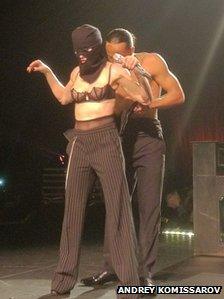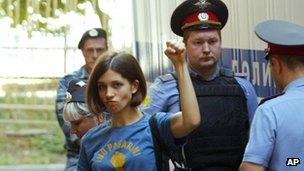Madonna appeal over Pussy Riot
- Published
Madonna shows the group's name on her back during her performance
US singer Madonna has appealed for the release of three members of the Russian punk band Pussy Riot during a concert in Moscow.
The singer told a crowd at the Olympic Stadium on Tuesday night that she was praying for the women's freedom.
She briefly wore a balaclava - in a nod to Pussy Riot's trademark outfits - and had the group's name on her back.
Prosecutors have called for the women, who are accused of inciting religious hatred, to be jailed for three years.

Madonna donned Pussy Riot's trademark balaclava
The judge is expected to start delivering her verdict on 17 August. Announcing the verdict could take days, correspondents say.
Maria Alyokhina, 24, Nadezhda Tolokonnikova, 22, and Yekaterina Samutsevich, 29, played a song attacking Russian leader Vladimir Putin in front of the altar of Moscow's main cathedral on 21 February.
They said it was a reaction to the head of the Russian Orthodox Church, Patriarch Kirill, publicly backing Mr Putin in elections.
'Repression'
Addressing cheering fans at the stadium, Madonna said: "I know there are many sides to every story, and I mean no disrespect to the church or the government, but I think that these three girls - Masha, Katya, Nadya - I think that they have done something courageous."
"I know that everyone in this auditorium, if you are here as my fan, feels they have the right to be free," she said.
Other international musicians including Sting and the Red Hot Chili Peppers have also appealed for leniency.
Artist Yoko Ono has spoken out in support of the band.
In a Twitter post, John Lennon's widow said: "Mr Putin you are a wise man & dont need to fight with musicians & their friends."
In a closing statement to the court on Wednesday, Pussy Riot's lead singer, Nadezhda Tolokonnikova, said the court was carrying out a Stalin-era "political order for repression".
She said that the authorities had refused to listen to the group, and that it was "not a trial over Pussy Riot but of the entire Russian political system".
The three women have been sitting inside a glass cage at the courtroom.
Last week, Mr Putin, who was re-elected president in March, called for leniency towards the women during a visit to London for the Olympic Games.
There are fears among Russian opposition activists that the trial is part of a crackdown on dissent since Mr Putin's return to the Kremlin, following the biggest anti-government protests in recent Russian history.

Nadezhda Tolokonnikova has remained defiant in court
Pussy Riot's performance inside Christ the Saviour Cathedral was captured on video.
The women danced and sang a song which parodies a Christian prayer, imploring the Virgin Mary to rid Russia of Mr Putin.
Defence lawyer Mark Feygin argued on Tuesday that the case against the women did not stand up because they had been charged with hooliganism under Article 213 of the Russian penal code, external yet no violence or damage had occurred or been threatened.
- Published30 July 2012
- Published30 July 2012